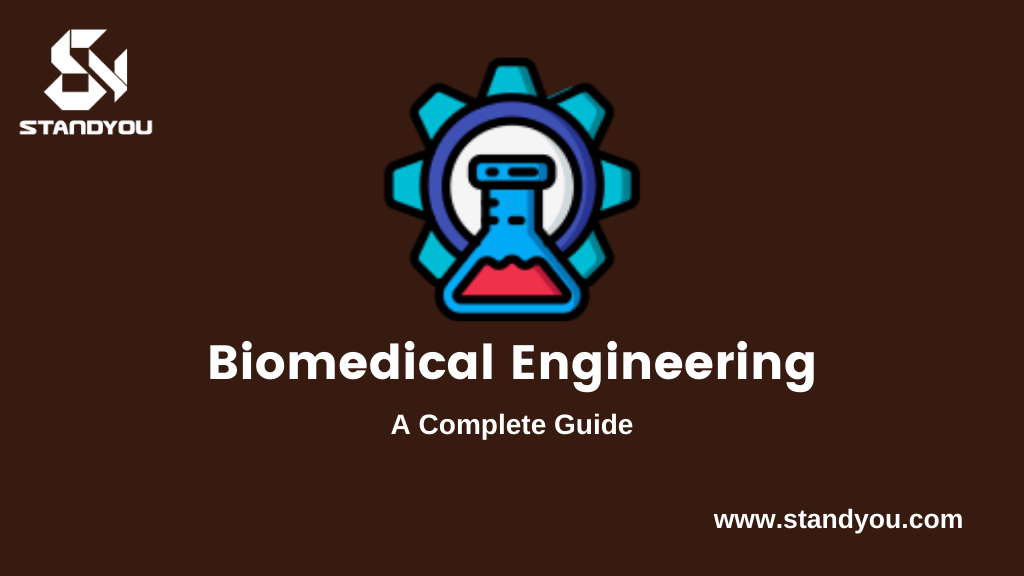Read the complete details of Biomedical Engineering:- A Complete Guide. ....

Nov 22, 2020 04:21:25

What is Biomedical Engineering? How do you become a Biomedical Engineer? Studying Biomedical Engineering? How much does a Biomedical Engineer earn? The salary you can earn as a Biomedical Engineer? What kind of skills are required to be a Biomedical Engineer? Popular institutes offering courses in Biomedical Engineering? Educational qualification required to be a Biomedical Engineer? Common Biomedical Engineering specializations? Biomedical Engineering: What are the career opportunities?
Here is the answer to all the above questions and a complete Guide for Biomedical Engineering.
Biomedical Engineering (BME) is also known as Medical Engineering or sometimes Bioengineering or BioMed. Biomedical engineering is the field in which the engineering principles are applied and the design concepts are applied to medicine and biology for healthcare purposes. For example a diagnostic or a therapeutic. This field closes the gap between Medical treatment and Engineering.
They combine the designing and problem-solving skills of engineering. The combination is done with the help of medical-biological advances and health care treatments. It includes diagnosis, monitoring, and therapy. Biomedical engineering is the management of current medical equipment in hospitals. This involves the making of the equipment, procurement, routine testing, and preventive maintenance.
Biomedical Engineering has evolved over years. It has now emerged as its own study in comparison to other Engineering fields. Biomedical Engineering consists of research, development, and spanning. It includes the development of biocompatible prostheses, diagnostic and therapeutic medical devices for example the clinical equipment and micro-implants, common imaging equipment for example the MRIs and EKG/ECGs, regenerative tissue growth, pharmaceutical drugs, and therapeutic biologicals.
Forbes said the following words for Biomedical Engineering
“The High-Paying, Low-Stress STEM Job You Probably Haven’t Considered”.
Biomedical Engineering is a multidisciplinary STEM field. The increased demand for Biomedical Engineering shows that society is shifting towards everyday utilization of machinery and technology in all aspects of life. This combination of engineering principles with biological advances to fulfill medical needs has contributed to many of the development and life-saving concepts. Some of them are mentioned below:
Artificial organs
Surgical robots
Advanced prosthetics
New pharmaceutical drugs
Kidney dialysis
So Biomedical Engineering is a very broad field with different areas. It is a new booming career option as health and technology are combined together to evolve the field of machine. Engineering is applied in the healthcare sectors giving rise to this Biomedical Engineering. It is one of the most reliable sectors in the medical sector. The Biomedical Engineers collab with doctors and researchers to develop these medical systems, equipment, or devices that are used to solve medical problems.
Biomedical Electronics
Biomaterials
Computational Biology
Cellular, Tissue and Genetic Engineering
Medical Imaging
Orthopaedic Bioengineering
Bionanotechnology
The path of becoming Biomedical Engineering starts with an undergraduate degree in the relevant fields such as
Biomedical Science or Engineering
Electrical or Electronic Engineering
Mechanical Engineering
Physics
After the completion of the undergraduate studies in the relevant fields, the aspirant has to study a Master's or Ph.D. degree in Biomedical Engineering.
The student aspiring to become a Biomedical Engineer does not specifically have to major in this subject but has to study the related field as mentioned above. The following list of subjects are important:
Maths
Chemistry
Physics
Computer Programming
Molecular Biology
Genetics
So if one is thinking of biomedical engineering as a career path he or she must pursue an undergraduate degree with the STEM subjects that are Maths, Chemistry, Physics, and biology. Also while pursuing the aspirant must gain work experience in this field. The universities offer several internship opportunities which help to gain industry experience.
The average salary you can earn as a Biomedical Engineer is up to 3 lakhs per year. As the experience in the field increases the salary also increases. Also, the salary varies according to job profiles. There are several types of jobs in biomedical engineering.
With the increase in healthcare awareness and the change in the lifestyles of people, the types of jobs in this sector are increasing. The aspirants of Biomedical Engineering can choose the job profile according to their interests. The following are some of the career options for Biomedical Engineers:
Medical Engineering Technicians
Specialists
Significant Experience / Team Managers
Head of Department / Consultants
Biomedical Engineer
Rehabilitation Engineer
Clinical Engineer
Bioengineering Research
Biomedical Engineering is a combination of healthcare and Engineering which involves the application of engineering principles to create a solution for the treatment and do the development and design of a medical product.
So an important skill required by the aspirant is careful measurement. Along with these analytical skills and a good eye for designing, keen observation, attention to detail, the ability to have a conversation with the patients, and team working skills are some important skills required for Biomedical Engineering.
There are many institutes and universities that offer diplomas, undergraduate, postgraduate, and doctorate programs in Biomedical Engineering. Some of them are mentioned below:
Indian Institute of Technology, Delhi
Manipal Institute of Technology, Manipal
Netaji Subhash Engineering College, Kolkata
Indian Institute of Technology, Mumbai
SRM University, Kattankulathur
Vellore Institute of Technology, Vellore
Central University of Karnataka, Gulbarga
SRM University, Tamil Nadu
IIT Roorkee, Uttarakhand
Netaji Subhash Engineering College (NSEC), Kolkata
MIT, Manipal
Indian Institute of Technology, Bombay
Indian Institute of Technology, Delhi
All India Institute of Medical Science, Delhi
The Central University of Karnataka (CUK), Gulbarga
VIT University, Vellore
Indian Institute of Technology (BHU), Varanasi
An aspirant who wishes to study Biomedical Engineering must have cleared the 10+2 examination from the science stream with subjects like Biology, chemistry, mathematics, and physics. If the above-mentioned requirements are fulfilled he or she can apply for Biomedical Engineering.
There are several Biomedical Engineering specializations. Some of them are mentioned below:
1. Bioinstrumentation
The professionals in this field of Biomedical engineering deals with the designing and development of the tools and equipment that are used to treat the diseases and for diagnosis.
2. Biomaterials
The professionals in this field of Biomedical Engineering design and develop the materials that are required and are suitable for use within the human body.
3. Biomechanics
The professionals in this field of Biomedical Engineering are the ones who deal with human body movements. They are the ones who focus on designing and development of products that help with the motion inside the human body. For example; Artificial heart valves and joint replacements.
4. Clinical Engineering
The professionals in this field of Biomedical Engineering are the ones who work along with physicians and nurses and the other experts for the implementation and operation of the technologies. Clinical Engineers are the ones who take care of the medical products in the hospitals or any healthcare facilities.
5. Cellular, Tissue, and Genetic Engineering
The professionals in this field of Biomedical Engineering are the ones who work at the microscopic level to find the solutions for bigger problems. The biochemical engineers focus on cellular activities. They understand the progress of the diseases. So by this, they develop ways to treat or haly the diseases before the disease becomes more dangerous and lethal.
6. Medical Imaging
The professionals in this field of Biomedical Engineering are the ones who deal with the designing and development of devices that are used for the examination of human bodies from inside. This is used for the proper and quick diagnosis of certain diseases of the body organ.
7. Orthopedic Bioengineering
The professionals in this field of Biomedical Engineering are the ones who are responsible for the designing and development of products related to bones, muscles, joints, and ligaments. These products mainly include implants that are helpful for body movements. It also includes the complete replacement of certain bones, muscles, joints, or ligaments.
8. Rehabilitation Engineering
The professionals in this field of Biomedical Engineering are the ones who are responsible for the designing and development of prostheses. Prostheses aid the people to regain their normal functioning in their damaged body parts.
There are various career opportunities in Biomedical Engineering. This is a new booming career option. The following are 5 common job titles in Biomedical Engineering.
1. Manufacturing Engineer
The professionals in this field of Biomedical Engineering are the ones who develop and design medical products like medical instruments, imaging devices, prostheses, and others.
2. Physician
The professionals in this field of Biomedical Engineering are the ones who are called Medical doctors. This field is a very common route taken by many of the students of the medical school.
3. Software Engineer
The professionals in this field of Biomedical Engineering are the ones who focus on the development and designing of various computer programs used for various medical applications.
4. Quality Engineer
The professionals in this field of Biomedical Engineering are the ones who are responsible for examining medical products. Quality Engineers make sure that medical products are proper and meet certain standards and specifications.
5. Researcher
The professionals in this field of Biomedical Engineering are the ones who are responsible for finding solutions to medical problems. The researchers find solutions to the medical issues for the treatment. Some Researchers also teach in universities.
Biomedical engineering is a vast field that provides solutions to Medical problems using technologies. The opportunities in this field are vast in both research and the job sector. Immediately after graduation, you can get several offers from companies.